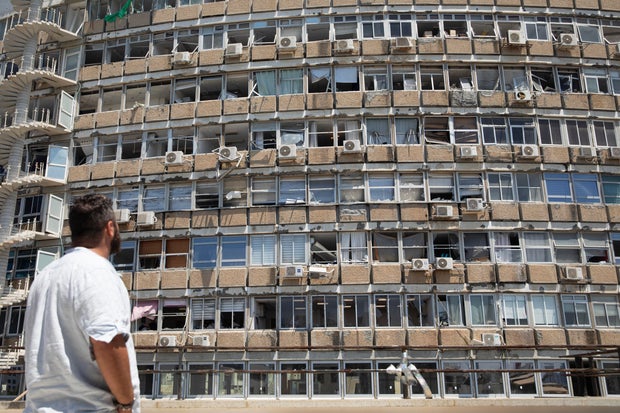[ad_1]
Israel retaliated for the Houthi drone attack in Tel Aviv with airstrikes in Yemen on Saturday that reportedly struck storage facilities for oil and diesel at a port.
A media outlet controlled by the Iran-backed Houthi movement in Yemen reported the airstrikes in the port city of Hodeidah, which also hit a local electricity company. Al-Masirah TV said the strikes caused deaths and injuries but gave no details, the Associated Press reported.
It said there was a large fire at the port and power cuts were widespread.
Health officials in Yemen told the AP the strikes killed a number of people and injured others, but did not elaborate.
/ AP
The Israeli military said in a statement Saturday that fight jets struck military targets of the Houthis in the area of Al Hudaydah Port in Yemen. It said the strikes were in “response to the hundreds of attacks carried out against the State of Israel in recent months.”
A U.S. official also confirmed to CBS News that Israel conducted the airstrikes in Yemen in retaliation for the Houthi drone attack in Tel Aviv on Friday that killed at least one person and wounded at least eight others. The official said there was no U.S. involvement in Saturday’s airstrikes.
Houthi spokesman Mohammed Abdulsalam wrote on social media platform X that Yemen was subjected to a “blatant Israeli aggression” and said the attacks aim “to increase the suffering of the people and to pressure Yemen to stop supporting Gaza.”
Abdulsalam said the attacks will only make the people of Yemen and its armed forces more determined to support Gaza.
Israeli Minister of Defense Yoav Gallant said on Saturday they retaliated because it was the first time the Houthi rebels “harmed an Israeli citizen.”
“And we will do this in any place where it may be required,” he said. “The blood of Israeli citizens has a price. This has been made clear in Lebanon, in Gaza, in Yemen, and in other places – if they will dare to attack us, the result will be identical.”
Israel Prime Minister Benjamin Netanyahu said the port that was attacked was not “an innocent port” and that it was used as an “entry point for deadly weapons supplied to the Houthis by Iran.”
“I have a message for Israel’s enemies: don’t get us wrong, We will protect ourselves in every way, on every front. Anyone who harms us will pay a very heavy price for his aggression,” he said.
AMIR LEVY / Getty Images
A large explosion rocked the streets of central Tel Aviv in the early Friday morning hours, jolting Israelis out of bed, shattering windows and raining down shrapnel. Later, Israeli military officials said the explosion was caused by a drone fired from Yemen.
Houthi rebels, which have been fighting Yemen’s internationally recognized government in a decade-long civil war, claimed responsibility for the explosion, saying in social media messages that it marked a “new phase” in its operations against Israel in response to the Israelis’ ongoing war against the Houthis’ ideological ally Hamas.
The Houthis said the strike used a “new drone called ‘Yafa’, which is capable of bypassing the enemy’s interception systems,” but a U.S. official told CBS News on Friday, echoing the Israeli military’s analysis, that it appeared to have been one of the group’s existing drones, with a modified fuel tank to extend its range.
The explosion caused by the drone was very near the U.S. consulate in Tel Aviv, but it remained unclear whether that was the target.
Based on verified social media videos, CBS News confirmed the blast occurred a little more than 200 yards from the U.S. consulate in Tel Aviv. A U.S. official told CBS News that no American casualties had been reported.
Since January, the U.S. and British forces have been striking targets in Yemen, in response to the Houthis’ attacks on commercial shipping that the rebels have described as retaliation for Israel’s actions in the war in Gaza. However, many of the ships targeted are not linked to Israel.
The joint force airstrikes have so far done little to deter the Iran-backed force.
The Houthis have launched drones and missiles at Israel and at commercial and military vessels in the Red Sea and surrounding waters throughout the nine-month war, in solidarity with Hamas. But until Friday, all the weapons fired at Israel had been intercepted by either Israel or its Western allies.
CBS News’ Tucker Reals and Eleanor Watson contributed to this report.





